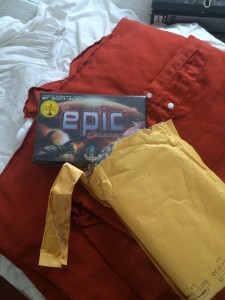Gav Thorpe's Blog, page 29
November 11, 2015
Convention Secundus
More details have now been released for this weekend’s fan-arranged Convention Secundus event, celebrating all things Black Library. Neil Roberts has now been added to Sunday’s bill, which immediately makes the event 100% more awesome.
Unfortunately I can only attend Sunday, as I’m due to be on a panel at Novacon on the Saturday. Before I head off to Novacon however, I intend to make a quick dash over to GW Derby to pick-up my pre-order of Betrayal at Calth, so I can bring it on Sunday to make everyone jealous if anyone wants to have a look.
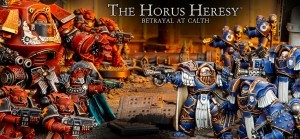
A “Sunday Morning with Gav Thorpe” session has been added. A typical Sunday morning for me is a trip to the park followed by frantic DIY and housework in the two hours that Sammy is asleep. Everyone is welcome to come and help me jet-wash the driveway, but if that doesn’t appeal, we can chat about my writing, my time at GW, and anything else that your enquiring minds want to know. If you can’t make the event, you can ask a question here, or on Facebook or Twitter, and I’ll answer your question on Sunday (and reply to you after the event).
Here is Sunday’s line-up in full:
Sunday:
Writers Room (All Day): Small room for drop in visits. Write some, read some, offer critiques to your fellows and get some feedback on your work. Perfect for getting a head start on our Abyssal Crusade Writing Challenge Type Thing
***
10:00-11:00 – Audio killed the video star:
Audio books, the Black Library makes a fair few of them, but no pop videos as of yet. Makes you think doesn’t it? If you want to think more about this we have three folks who have been involved in various aspects of Audio Book production to enlighten you on what the hell it all means. Gav Thorpe, CZ Dunn and Laurie Goulding
11:15-12:15 – Sunday Morning with Gav Thorpe:
If this was commercial radio we’d be promising you the perfect soundtrack to making your roast dinner. It isn’t so we make no promises.
12:30-13:30 – The Neil Roberts Art hour:
Neil Roberts, his art portfolio and his willingness to speak. See the things that put the awe into awesome and hear “some” comments about how and why they look like they do.
13:30-14:30 – Lunch
14:30-15:30 – The All Star Horus Heresy Debate:
“Horus Lupercal was the best choice for Warmaster.” An all star panel sit down and discuss if this statement is true or not.
15:45-16:45 : – Anecdotes of the damned:
Editors current and former Christian Dunn and Laurie Goulding will inform and horrify in equal measure as they discuss the unholy art of the red pen.
17:00-18:00 – The Convention Secundus Character Creation Contest:
All weekend you’ll be invited to go on twitter and using the hashtag #CSCCC to create a character for any GW setting to be judged. Winners get to feel proud. Example: “#CSCCC Badmouf Toestubba. Known for his inventive insults and magic boots. Oft found kicking other Orcs to death rather than leading Waaaghs” The Shortlist of entries will be read out to be judged by our guests.
Because this is a smaller event that a normal convention, I’m hoping it’ll be like getting together with friends, and that I’ll get to chat with everyone. I’m really looking forward to it.
**To make sure you don’t miss out on any blog posts, you can keep up-to-date with everything Gav by signing up to my monthly newsletter. As a bonus, every other month I randomly pick a newsletter subscriber to receive a free signed copy of one of my books.**
November 7, 2015
Author Out in the Wild
 Convention season is coming to an end, and I’m hoping it will go out with a bang at the fan-arranged Convention Secundus next Sunday. Before I get to that though, I will be attending Novacon on the Saturday.
Convention season is coming to an end, and I’m hoping it will go out with a bang at the fan-arranged Convention Secundus next Sunday. Before I get to that though, I will be attending Novacon on the Saturday.
Next weekend sees the 45th year of Novacon, a “single stream fannish SF con with a literary bent”, attended by guests of honour Anne and Stan Nicholls. Arranged by Birmingham Science Fiction Group, Novacon has been held in my local city of Nottingham for the past six years, but this will be the first year I’ve been able to attend. I’ve been asked to appear on a lunchtime panel discussing “There is very little decent SF being written nowadays” along with Janet Edwards, Bryony Pearce and Chris Nuttall.
When I’m not on or watching a panel, you will probably find me in the bar, catching up with friends and industry colleagues.
Assuming I make it out of the bar in one piece, on the Sunday I will be bright-eyed and bushy-tailed at Convention Secundus, also held in Nottingham. There have been a lot of changes at Black Library this year, and efforts have been clearly focussed on publishing some great fiction, which has unfortunately meant there was no time for an official Black Library event.
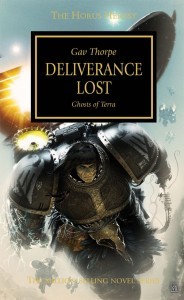
You will also be able to meet Deliverance Lost’s cover illustrator Neil Roberts
I hope they re-instate the Black Library events in the future, but if not, maybe Convention Secundus can take its place. Arranged by avid fans the two-day event includes seminars, a writers room (to read and critique your writing), and the obligatory bar for informal social interfacing (or conversation as I believe normal people call it). I’ll be discussing the Horus Heresy under the guise of the assertion, “It is the opinion of this convention that Horus was the best choice for Warmaster” with Christian Dunn and Laurie Goulding – a silly statement when we all know Sanguinius would have been the best choice. I’m also intending to spend some time in the writers room to chat with anyone who has any questions about the writing process. No doubt I will also be in the bar some of the time…So there we have it, my last authorly outings of the year. Come and say hi if you’re attending either of these events.
To help me with my preparation for the Novacon panel, what ‘decent’ science fiction from 2015 would you recommend to a friend? I’m looking for really up-to-date, genre-defining, Best in Show stuff that maybe folks might not have heard about before.
**To make sure you don’t miss out on any blog posts, you can keep up-to-date with everything Gav by signing up to my monthly newsletter. As a bonus, every other month I randomly pick a newsletter subscriber to receive a free signed copy of one of my books.**
November 4, 2015
DWARF – Winter War
 I was recently contacted by Dunfermline Wargaming and Roleplay Fellowship (DWARF) about their annual charity event Winter War. It’s no secret that I have a soft spot for the bearded ones (dwarfs that is, I’m not insinuating anything about the hairyness of the Dunfermeline massif), so of course I was happy to get involved. Here is the information about the event:
I was recently contacted by Dunfermline Wargaming and Roleplay Fellowship (DWARF) about their annual charity event Winter War. It’s no secret that I have a soft spot for the bearded ones (dwarfs that is, I’m not insinuating anything about the hairyness of the Dunfermeline massif), so of course I was happy to get involved. Here is the information about the event:
“For the 8th year Dunfermline Wargaming and Roleplaying Fellowship presents Winter War, our annual charity event.
Over the last 7 years the generosity of the community has enabled us to raise over £8000 for The Poppy Appeal and Help for Heroes.
Unfortunately earlier this year one of our club members Iain Cochrane lost his fight against cancer and in honour of his memory we have decided that this year we are going to be GOING BIG to beat cancer.
We will be raising funds for two organisations who cared for Iain and his family during his fight
Maggies Centres https://www.maggiescentres.org/
and
St Columbas Hospice http://www.stcolumbashospice.org.uk/
We will be holding the usual mega-raffle with some extras, and playing not 1 system but 5!
That’s right 5!
We will have a 32 player Age of Sigmar tournament using Mo Ashrafs excellent Clash Comp
A 28 player 40k tournament
A 22 player Bolt Action tournament
A 12 player Flames of War tournament – period tbc
and
A 16 player Guildball tournament.
Full packs will be released shortly, tickets will be £15 each and include lunch, teas and coffees.
An important note on Best Army Voting – because of the number of systems and people participating as well as the lay out of the building, lunch and time required for raffle we will be holding Best army votes by game system. So AoS for AoS, 40k for 40k etc etc.
Thanks in advance for your support and more importantly money!”
 I shall be donating signed copies of three of my dwarf books – Grudge Bearer, The Doom of Dragonback, and Grudgelore. Please give the event your support if you can.
I shall be donating signed copies of three of my dwarf books – Grudge Bearer, The Doom of Dragonback, and Grudgelore. Please give the event your support if you can.
You can find further information about the club and event here:
Club website
Club Facebook group
Club Twitter account
**To make sure you don’t miss out on any blog posts, you can keep up-to-date with everything Gav by signing up to my monthly newsletter. As a bonus, every other month I randomly pick a newsletter subscriber to receive a free signed copy of one of my books.**
October 21, 2015
Synopsis Advice
 Synopses have very much been on my mind of late, as I’ve had to make submissions for Black Library, and plan a speculative original fiction series that I’m hoping to pitch to a publisher soon (The City of Eternal Days will hopefully see the light of… err… day, soon).
Synopses have very much been on my mind of late, as I’ve had to make submissions for Black Library, and plan a speculative original fiction series that I’m hoping to pitch to a publisher soon (The City of Eternal Days will hopefully see the light of… err… day, soon).
My history with Black Library and relationships with the editors has meant that my synopses for them have varied from a two-line short story idea, to a two-page synopsis for a trilogy and first book outline. Of course a synopsis isn’t just for the editors, it also helps you, as the writer, keep the story on track. If you reach a roadblock in your writing it’s well worth referring back to your original synopsis to check you haven’t gone astray, or to identify issues with the story that are only coming to light now you’re half-way through.
It is becoming clearer to me that having a good concise synopsis makes for a quicker and easier writing process. Spending the time upfront will save you time later in the process, which is particularly important when you are working to a deadline. I’ve published a few blog posts about writing a synopses, as well as actual synopses that I’ve submitted, and I thought it would be useful to bring these together in one place for anyone out there who is struggling with this particular aspect of writing.
Synopsis Advice
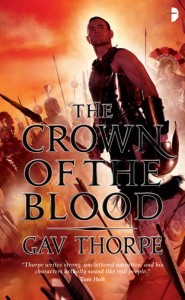 I go through several stages when writing a synopsis: concept > structure > notes > synopsis. The first three stages are outlined in this blog post, along with an example of the ‘notes’ version for my book Shadow King. I also blogged about using plot-cards when fleshing out the synopsis for Deliverance Lost. And here you can read my structural notes for The Crown of the Blood – this was my first original fiction trilogy, so they are more comprehensive than something I would usually produce for Black Library.
I go through several stages when writing a synopsis: concept > structure > notes > synopsis. The first three stages are outlined in this blog post, along with an example of the ‘notes’ version for my book Shadow King. I also blogged about using plot-cards when fleshing out the synopsis for Deliverance Lost. And here you can read my structural notes for The Crown of the Blood – this was my first original fiction trilogy, so they are more comprehensive than something I would usually produce for Black Library.
With my tie-in fiction the story ‘topic’ is often suggested to me by the publisher, along with the required length (for example short story / novella / novel). This blog post discusses fitting your story to the suggested word-count, and how this relates to the synopsis.
When writing an original fiction novel, or an area of tie-in fiction that I’m not overly familiar with, I’ll often create an emotional psychological study of the main characters, which in turn feeds into creating a thoroughly considered synopsis; you can read about this process here.
A couple of blog posts highlighted the usefulness of the synopsis to the writer, with real-world examples of how a synopsis can help focus thoughts when reading through a completed first draft, and using a synopsis to identify issues with your writing.
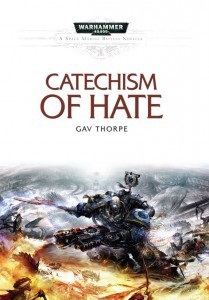 Here are the sample synopses for some of my published books (needless to say, they contain spoilers if you haven’t read the books yet):
Here are the sample synopses for some of my published books (needless to say, they contain spoilers if you haven’t read the books yet):
13th Legion
Angels of Darkness
Annihilation Squad
Caledor
Catechism of Hate
The Ninth Book
I published a few caveats for the Annihilation Squad synopsis, which applies to all those listed above, so it’s worth publishing again here.
Writing doesn’t always go smoothly, and I’ve written about some challenges I’ve faced as a result of a poor synopsis here and here. Hopefully these will help others avoid the same issues.
Unless you’re writing entirely for your own amusement at some point you’ll have to pitch your story idea to a publisher. This blog post discusses pitching your story, and gives general advice on what the synopsis should look like.
And finally, if you want to read everything I’ve written that contains even a smidgeon of advice about synopses, click on the “Writing Advice – Synopsis” tag link below.
Being a writer is a constant process of learning and improvement, so if you have any advice or experiences with writing synopses, please share them in the comments. If you have any questions, I’ll do my best to answer them.
**To make sure you don’t miss out on any blog posts, you can keep up-to-date with everything Gav by signing up to my monthly newsletter. As a bonus, every other month I randomly pick a newsletter subscriber to receive a free signed copy of one of my books.**
October 17, 2015
FantasyCon and Other Event Goodness
 The last month has flown past, what with finishing the draft of my first Age of Sigmar novel and working on Angels of Caliban for the Horus Heresy. So it is almost with shock that I realise it’s only a week to go until FantasyCon 2015.
The last month has flown past, what with finishing the draft of my first Age of Sigmar novel and working on Angels of Caliban for the Horus Heresy. So it is almost with shock that I realise it’s only a week to go until FantasyCon 2015.
So, here’s the lowdown. Next weekend, 23rd-25th October, a whole bunch of fantasy nerds, some in a professional capacity, will converge on Nottingham University to attend panels, talk about their favourite books, films, comics, TV and authors, drink some beer or other beverages of choice, and generally hang about unashamed of their anoraks. There is also the British Fantasy Awards banquet on the Sunday.
Being in Nottingham, there is also the opportunity to nip over to Warhammer World and the new Citadel Miniatures exhibition, just ten minutes away.
Where and When to Find Me
I’ll be in attendance for the whole weekend, so if you see me ambling about or generally lounging please feel free to come and say hello. You can also locate me on two specific occasions.
On Friday night I’ll be in the Reading Room at 8.20pm, with a reading from a forthcoming piece of original fiction for Weird Ales by Knightwatch Press and… well, something else, hopefully Black Library related.
And then on Saturday:
Sat 24 Oct 2.00pm War: What Is It Good For? Martial Conflict in SFF
Moderator: Natasha Bardon
Panellists: Steve Aryan, Bradley Beaulieu, Sophia McDougall, Adrian Tchaikovsky
War continues to abhor and fascinate us as writers and readers but portraying it brings many challenges. This panel goes into battle on the following campaign fronts:
• are the reasons for war too simplistic in genre fiction?
• depictions of combat, martial training and practice
• writing about violence, injury and death in action
• the after-effects of war on fighters and non-combatants
• alternative resolutions, diplomacy and showing all sides
What do YOUR characters fight for?
A full breakdown of the panels and other attractions can be found here. And if that isn’t enough to entice you, I might end up here…
Room: Conference Theatre
9.00pm FantasyCon 2015 DISCO
‘til 1am The traditional FantasyCon disco returns, featuring banging beats and cheesy tunes, brought to you by DJs Marc Gascoigne and Guy Adams. Dancing trousers optional.
 Special Preview Showing!
Special Preview Showing!
If you’re visiting for FantasyCon, or just local to the area, why not arrive in Nottingham a day early and come see me at the Nottingham Writers’ Club. They’re having a Sci-fi Night and I’ll be there with author Stephen Palmer and writer/ publisher/ editor/ eventy bloke Alex Davis of Boo Books and Edge.Lit. Drinks (both of the civilised and falling-down variety) are available at the venue and I’ll be bringing the biscuits (specific requests in the comments section please, special dietary requirements accommodated).
“The evening will be a chance to meet the authors, ask them questions, listen to readings, get advice, buy novels, etc. Every ticket holder gets a goody bag.”
And In The Near Future…
When FantasyCon fades into memory I’ll be preparing for a visit to NovaCon and Convention Secundus. I’m also hoping to arrange a signing and fun times at the Loughborough GW store in the coming weeks. Look out for more details of these events shortly.
**To make sure you don’t miss out on any blog posts, or details of future events, you can keep up-to-date with everything Gav by signing up to my monthly newsletter. As a bonus, every other month I randomly pick a newsletter subscriber to receive a free signed copy of one of my books.**
October 14, 2015
Why Writers Need To Join The ALCS
 Not so long ago I was invited to the shiny new offices of the ALCS in the swish City of London. As a recently recruited member I was part of a focus group on the organisation’s website and their enrolment process.
Not so long ago I was invited to the shiny new offices of the ALCS in the swish City of London. As a recently recruited member I was part of a focus group on the organisation’s website and their enrolment process.
“Who?” you ask. If you are based in the UK and write anything – journal essays, books, short stories, scripts, articles – then you should be a member of the Authors’ Licensing and Collecting Society. Even if it’s just a single study in a medical paper, or a review in a magazine, you could be owed monies for rights use overseas.
The ALCS are a group that manage overseas copyright licensing and international Public Lending Rights issues (PLR) for British writers. By licensing copyright to academic institutions, businesses, public bodies and the like in over 40 countries, the ALCS earn you extra money for your work. They also collect the equivalent of PLR in eight other countries (although if you are registered with UK PLR you already have the option of directly registering with the Irish system too).
PLR is the money you are owed as an author for copies of your work being leant out from public libraries, to compensate for lost sales royalties. Currently it stands at 6p per loan for the UK, capped at a maximum of £6,600 (so JK Rowling and other bestsellers don’t take the whole pot of cash). Other systems are in place in many other countries, although accessing each could be tricky which is where the ALCS come in. Unfortunately, there is currently no US PLR system…
Interesting fact – although not widely available in stores The Crown of the Blood series continues to make me a few quid a year in PLR payments, and the books are taken out more than many of my Black Library titles.
Top facts about the ALCS:
• Licensed copying in over 40 countries and PLR in eight countries.
• More than 87,000 members.
• Paid out £32,000,000+ to members last year.
• An independent company – not a government quango.
Author Earnings
The ALCS regularly conducts a survey of its members to track writers’ earnings and shifts in the writing industry. They released this in their ‘What are Words Worth?’ Report. Most dramatically they have charted a decline from 40% of authors in 2005 who defined themselves as ‘professional’ to just 11.5% in 2013. Median author earnings are down from £15,450 (real terms) to £11,000. Part of this can be attributed to more people taking up writing in their spare time, but other studies have shown a sharp drop in the earnings of authors.
For these reasons it is important that writers explore every revenue stream they can, and the ALCS is a straightforward step toward accessing additional funds. You can read analysis of the report here.
 “Free money? Where do I sign?”
“Free money? Where do I sign?”
The registration process is slightly cumbersome, mainly due to the need for the ALCS to check you are who you say you are and that you have written what you say you have written. You can register online and will be required to enter your details and list your works by title and (where appropriate) ISBN.
When you have done this the folks at ALCS will double-check your registration and send you a welcome pack, a couple of other forms to complete and a membership card. It is a little laborious in this modern digital age, especially if you have many back titles and overseas editions to add, and they are looking to streamline the system based off recent feedback (including from the focus group I was in).
There is a one-off lifetime fee of £36 but you do not pay this until you have received any monies from the ALCS. It’s kind of like a no win, no fee deal – you don’t pay anything for membership until the first statement in which you earn money. If you are a member of the Society of Authors, National Union of Journalists, and a few other organisations your membership of the ALCS is free.
So, in summary what you have to do is:
• Register at the ALCS website.
• Fill in the details of your works and keep the list updated.
• Pay £35 out of your first royalties for lifetime membership.
• Receive royalties statements every six months for life.
Caveat – As a new member, and with a bit of confusion over my registration because of a server thing, I haven’t received my first statement yet. It could be pennies, it could be quite a lot of money. I don’t expect to pay off the mortgage just yet, but even if it’s enough for a nice meal it’ll be worth it.
Not a Scam
The ALCS might already be collecting money for you. The ALCS take a percentage of your earnings as commission, which is why they are eager to hunt down writers that are owed money so that they can take their cut. A bit like those will beneficiaries in Heir Hunters (okay, maybe you haven’t seen as much daytime TV as me…) the ALCS have collected monies for writers that they are trying to pass on. You may find yourself receiving a letter from the ALCS saying that they have money for you. It isn’t a scam, they won’t ask for any money up front.
“Statistics produced by the Department of Culture, Media and Sport in 2014 show that the creative industries are now worth £71.4 billion per year to the UK economy (over £8 million per hour), and the UK is reported as having “the largest creative sector of the European Union”, and being “the most successful exporter of cultural goods and services in the world”, according to UNESCO.” From ‘What Are Words Worth Now? Not Enough’
Writers’ Advocacy
So we all like extra money, but the ALCS isn’t just about padding the bank account. They are an advocacy organisation too, arguing for creators’ rights at the UK and EU level. They work with the All Party Writers Group in parliament, deal with the Arts Council, as well as lobbying for writers’, erm, rights across at the EU.
With the increase in digital publishing, piracy, libraries facing government cuts and other strains on the creative industries it is important that the rights and earnings of writers as well as publishers and producers are safeguarded. Not only that, a small proportion of the commission you pay on your royalties goes to the ALCS ‘Support & Sponsorship Fund’ to directly help writers with grants.
So, in case you missed it, go to the (slightly dated but soon-to-be-revised) website and find out more: http://www.alcs.co.uk/Home.aspx
**To make sure you don’t miss out on any blog posts, you can keep up-to-date with everything Gav by signing up to my monthly newsletter. As a bonus, every other month I randomly pick a newsletter subscriber to receive a free signed copy of one of my books.**
October 7, 2015
Things I Always Do
 Most writing advice comes from a place of idealism – all the things you should think about, do and experience in a perfect world. Cajoling the creative spark, research, preparing, putting in the hours, reading good stuff, editing and rewriting, redrafting, copy editing, putting it aside for 6 months, reading groups and feedback, reading the work out loud, spellchecking; the list goes on and on.
Most writing advice comes from a place of idealism – all the things you should think about, do and experience in a perfect world. Cajoling the creative spark, research, preparing, putting in the hours, reading good stuff, editing and rewriting, redrafting, copy editing, putting it aside for 6 months, reading groups and feedback, reading the work out loud, spellchecking; the list goes on and on.
That’s great if you are working on your first novel and don’t have a deadline, or you have achieved the sort of success that allows you to write one book every now and then, or you have a day job that actually pays the bills.
The reality for many writers, full-time or otherwise, is that we must cut the cloth to fit. To keep a roof over our heads, pay the bills and feed the family I need to put out a certain amount of work every year. If you want to write as a career (and by that I mean hedging your bets by putting out a consistent volume of work over a period of years, even if you have alternative income)then you have to learn where and when to spend the time and when to be more pragmatic.
I’m not in that mould of writers that are filled with self-loathing by every word they set on the page. I enjoy writing, even when it’s difficult and slow, and despite the odd hiccup I believe I have some degree of skill. However, there is always room for improvement. From typos spotted too late to characterisation opportunities missed, to wonky dialogue, it can always get better with another read-through and edit.* At some point though, the ‘Print and be Damned’ principle applies, and the more deadlines you have the better you have to be at being light on your feet with this sort of thing.
(*Except not. When getting ready to pitch The Crown of the Blood to Marc Gascoigne at Angry Robot I redrafted the first ten thousand words so many times I turned it into a big pile of purple turds. Like an overworked dough it was stodgy and heavy. The pace at which I normally write is directly linked to my natural style and by rewriting so many times I wandered from the well-trodden path into the thickets and got lost. Thanks to some copious red pen from Marco it was a mistake I have avoided since.)
So, bearing in mind that time is not a limitless resource, these are the things I always do when writing.
Some writers don’t like planning. I get that. I’ve tried it. It’s liberating in its way. It’s also really inefficient. There’s a certain mystique, almost pride about ditching 30,000 words in the redraft, or axing an entire character, or adding a whole subplot. That wastes quite a lot of time, on top of the time already spent on the first draft.
What works really well is doing all of that thinking and chopping in summary form – a synopsis or chapter plan. Moving a chapter in a synopsis is far less aggravation than doing it in a full draft. I know because the last couple of projects I’ve worked on I’ve had to do some of that and it’s a pain in the arse.
Planning doesn’t stifle creativity, it provides a framework for it. It forces you to think about what you are going to write before you commit – it allows you to ask questions and come up with the answers before you get bogged down in the trenches of the actual manuscript.
Things will change. Chapters might still move. Characters may still turn up or get dropped, storylines can be flexible, but far less than if you wing it all of the way through the first draft.
Try it.
Don’t start with all that ‘But I’m an artiste’ rubbish. ‘I don’t know what I’m writing about until I’ve written it’, you say? Well, that’s going to be really tricky because a lot of agents and publishers these days are looking to sign two- and three-book deals, so unless you’ve got something for numbers two and three you could be out of luck.
Sit down with all of those great ideas in your Moleskin or whatever it is that cool writers use these days, and put them into a logical order in a plan first. Use post-its, or Scrivener, or carefully arranged mosaic; whatever it is you need to help you rearrange and organise your thoughts. It’s only fair, I’ve tried writing stories without a plan so you owe me at least a token effort in return.
No, seriously, you need me to say this? Of course not, you’re already one of the sensible ones. And yet… You can’t rely on a spellchecker to catch everything but it does have to be your first port of call. Create a custom dictionary so you can add the names of characters and weird stuff that you’re bound to make up. It will instantly highlight when Colonel Grober became Colonel Gruber (unfortunately it won’t show you when he mysteriously became General Grober, that’s still on you).
On the other hand, it may be useful to turn off the in-line spelling and grammar checker. If you type fast but badly like me you’ll be bombarded with a page of red squiggly lines before you know it, and then you’ll want to go back and edit them, and then you’ll be rereading it all again rather than getting on with the first draft. (Incidentally, the Path of the Eldar books had so many crazy alien names and phrases that Word stopped trying to highlight them all about 2/3rds of the way through each first draft!)
Blacklist Bad Words and Phrases
I have a list of words and phrases that I use too much. ‘Moment’ is one of them. In my first drafts everything takes a moment, happens in a moment or lasts a moment. Events inevitably happen a moment later or for a moment. ‘Toward’ and ‘forward’ are others. ‘Then’ and ‘Now’ are good ones to look out for.
You can find some examples of common ‘weak’ words in this post but you also need to find your own little tics and foibles. Perform a Find function and delete them wherever possible. Or you can usually use the function to highlight the words in the prose if you want to see them as you are editing on screen. If you think you use a word too much, you can do a simple Find and Replace, it’ll tell you how many times the word has been used.
It’s worth doing this on the nouns you’ve used to avoid using a character’s name too many times (‘the detective’, for instance). Often changing to a pronoun works just as well.
Find them, kill them, don’t even blink.
While you are doing this, it’s also worth checking the words you frequently mis-type but that are still words. I almost always type ‘from’ as ‘form’. Muscle memory is a killer for this one. Sometimes the grammar checker picks it up, but not always, so I Find ‘form’ and inspect every incidence myself. I also have a habit of appending the ‘t’ in ‘the’ to the word in front – the word gets highlighted but the resultant ‘he’ doesn’t, so I have to keep a special eye out for that.
This is one that I am not so good at, but I am much better than I was.
Print out your story and read it. You cannot process the same amount of information on a screen, about 20% less according to some studies. Get the red pen out and get at it.
This can be quite troublesome for a full length novel, so find a good, secure document printing service online. The benefit of this is that you can usually get a decent binding for not much cost, which will stop you losing pages, having to staple a 300-page doc or other nonsense.
If you are using readers, an author’s group or similar, ensure they are reading from hard copies too (even if you have to go to the expense of providing them). If you have to, let them share a copy, but on the whole it is better if everyone reads their draft ‘clean’, free of anyone else’s thoughts or comments.
Mini-tip: While on the subject of feedback, collate all of it first before doing a redraft. For instance, if you are waiting on corrections and comments from a reader or editor don’t put in your own until you have everything. You can certainly do the red pen thing while you are waiting, just don’t touch the actual manuscript. Redraft as few times as possible – you won’t change something that needs to be changed again or later creates a contradiction.
Format Properly
Pertinent to the above, it helps immeasurably if you write with indented paragraphs (default setting is fine, the editors will change it to their own house style), use at least 1.5 spacing whilst writing and double spaced for printing. A 6-10pt paragraph spacing will help too. Proper margins as well.
And a sensible font. 12 point Times, Calibri, sometimes Courier is suggested but I think it’s a horrible font to work with on a screen.
Don’t try to save printing costs by using a smaller font, single-spacing, etc.
Basically, the reasons why things look good and read well on the printed page apply equally to when you are working on the manuscript – space and good format allow you to read more easily. It also saves time when it comes to submitting to a publisher if you already have most of the style in place.
Check out William Shunn’s formatting guidelines – if it helps an agent or editor to read your story it will help you!
Finish the Draft First
Don’t print out the first couple of chapters and start editing as soon as they are ready. There are a couple of good reasons for this.
Firstly, despite all of that planning you did (you did, right?) things might change. Until that first draft is done and dusted, you might want to go back and change what comes before. Need to introduce a character earlier? Came up with a cool thing but you want to foreshadow it? That thing you blew up in Chapter Five would be better off intact in Chapter Twenty?
Get everything down first, all the ideas on the page, and then you can evaluate them. You might find that the battle you thought would last for four chapters lasts for seven or one instead. Something else might expand in its place or need to be cut. Better to do these things digitally first, before you spend time with the red pen.
The editing process works something like this: big structural changes – refinement – copy editing – proofreading. You might well miss the first phase if you get sucked down into the detail of the second by reading every word and line.
 Secondly, you’ll get into the situation I did with the opening of The Crown of the Blood spiralling into an ever-decreasing circle of editing the same parts again and again. You’ll write the first few chapters, make the corrections and then edit them again. Not only might this lead to it being overwritten in places, it will mean you spend all your time perfecting the first half of the story or book and then don’t have enough time to properly edit the second.
Secondly, you’ll get into the situation I did with the opening of The Crown of the Blood spiralling into an ever-decreasing circle of editing the same parts again and again. You’ll write the first few chapters, make the corrections and then edit them again. Not only might this lead to it being overwritten in places, it will mean you spend all your time perfecting the first half of the story or book and then don’t have enough time to properly edit the second.
Try to work in complete drafts and make sure you mark the files properly – version management is essential!
Number Your Chapters
Even if you intend the chapters to have titles in the final version, or just numerals, always start each new chapter with the word ‘Chapter’. This makes it much easier to Find if you start to chop stuff around. When you’ve done with that, you can then jump from one to the next and make sure they all have the right numbers in sequence.
(If you use something fancy like Scrivener or actual proper header formats you can do this with different style sheets instead. I tried using Roman numerals for a time but that was more hassle than it’s worth when you have to renumber.)
Mini-tip: use the running headers and footers function to auto-update the date and put in page numbers – much easier to check versions and talk about changes if you have these references in common with readers and editors.
Hopefully that will help you become a slick writing machine. Other stuff – the reading out loud and all that – can come if you have the luxury of time. One day perhaps I’ll be a-novel-a-year sort of author, but until then I’ll just have to stick with well-planned, quick and clean.
Oh, and the best way to ensure no time gets wasted? Autosave and back-ups. Always.
What are your “must-do” actions when completing a piece of writing? Use the comments section to let me know.
**To make sure you don’t miss out on any blog posts, you can keep up-to-date with everything Gav by signing up to my monthly newsletter. As a bonus, every other month I randomly pick a newsletter subscriber to receive a free signed copy of one of my books.**
October 3, 2015
Legends 2
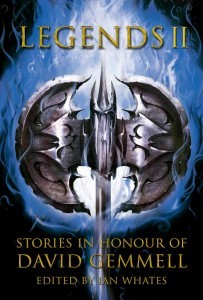 If you’ve been keeping up-to-date with my blog, you’ll know that I was really pleased to be asked to contribute to Legends 2, an anthology inspired by the writing of David Gemmell. The book also includes stories from the ever-talented Andy Remic, Edward Cox, John Gwynne, and Gavin G. Smith amongst many others.
If you’ve been keeping up-to-date with my blog, you’ll know that I was really pleased to be asked to contribute to Legends 2, an anthology inspired by the writing of David Gemmell. The book also includes stories from the ever-talented Andy Remic, Edward Cox, John Gwynne, and Gavin G. Smith amongst many others.
The book, which was edited by Ian Whates and published by NewCon Press, was launched at the 2015 David Gemmell Awards for Fantasy, held at the Nine Worlds Geekfest convention in August. You can read more about the launch party shenanigans in this blog post.
The first three reviews are now up on Amazon, with an amazing five stars given for each of them.
“Excellent for any Gemmell fan” 5 stars
– Michael Parton, Amazon
“Wonderful – if anything the stories are not long enough.” 5 stars
– Mel 43, Amazon
“I like these anthology collections, some authors I have read previously and look forward to their short stories. Other authors I have not read and I have now picked up their books as I Like their writing styles. Well done to the authors on a great book.” 5 stars
– Mr Antony Atkin, Amazon
You can read an extract from my contribution, The Blessed and the Cursed, here.
There are only a handful of the special edition signed hardback books left, but the paperback and eBook are readily available – full details can be found here.
If you’ve read Legends 2, I’d love to know what you thought of it. Please let me have details of any reviews you’ve written, or leave a message in the comments. Thanks.
**To make sure you don’t miss out on any blog posts, you can keep up-to-date with everything Gav by signing up to my monthly newsletter. As a bonus, every other month I randomly pick a newsletter subscriber to receive a free signed copy of one of my books.**
September 30, 2015
2015 The Year of Hobby: Kickstarter Special
 [image error]Admitting you have a problem is the first step to resolving a problem, right?
[image error]Admitting you have a problem is the first step to resolving a problem, right?
I have a Kickstarter problem.
There, I’ve said it.
Let me briefly explain…
Innocent Beginnings and Sinister Developments
My first Kickstarter was for the inaugural Nine Worlds Geekfest. Having just returned from a geektastic time at a Sci-Fi Weekender in Wales I found someone linking to the Kickstarter page on my Twitter feed with an hour to go.
A decision was made, as was history.
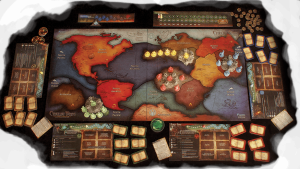
Who could resist the chance to conquer the world after the extinction of humanity and the rise of the Great Old Ones?
It was probably the best thing I’ve backed on Kickstarter, as that’s now three Geekfests we’ve been to and enjoyed every event. However that was just the start. The next three were all pretty big ones – I dropped several hundred pounds on Sails of Glory, Cthulhu Wars and Machina Arcana. I have since backed… Um… Ahem… 37 Kickstarters (well, successful ones, there are seven that were cancelled or didn’t fund).I’ve backed a mixture of big, small and micro games, some graphic novels and comics, a gaming cafe and even support for making board games blind accessible. Some have been quite a financial investment (I’m looking at you Atomic Robo Hardbacks!), some have basically been pocket money deals, great microgames that will set you back just a few notes including postage (like Province, the Tiny Epic series or Mint Tin Apocalypse).
And this arrived while I was writing this post. Serendipity!
In some ways it’s the worst type of retail addiction to have. All the instant gratification of impulse purchasing, but with no actual pay-off for months, sometimes a year or more! That said, there’s nothing like getting a parcel in the post when it finally arrives.What I Look For
Something different. Something eye-catching. The world is awash with faux-historical fantasy miniatures, post-apocalypse and zombie settings, steampunk ranges, ‘ameritrash’ conquest games, and many others. This is not a judgement on the quality of any particular product or project, just a personal preference. With so many projects these days what stands out? I really like to back a Kickstarter project that is trying something different, something that I know needs not just money but support and a community.
I’m a bit of a softy with my Kickstarter addiction. Though I don’t get involved much in the way of comments and such, I do feel I’ve taken a bit of a personal stake in each one I back and I’m invested in the project as a backer not just a consumer. I want to help creators get their creation into the world, not just bag a special bulk discount from a company that’s basically using Kickstarter as a marketing platform. I feel sad when a project I have backed doesn’t fund and a fleeting sense of guilt for those that I like but can’t back.
Promotion Counts Too
The entire concept of crowdfunding is, of course, to get a crowd interested. As well as the money I pledge I feel it is my duty as a backer to put the word out to other potential backers. Clever project creators reward such behaviour with stretch goals, but for me the simple goal of getting the project funded is enough motivation.
It is also why, given that I do not have infinite finances and space and time, I have recently taken to promoting Kickstarter projects I like but have not backed. If I cannot invest ready cash I can invest a little time. It’s not big-headed to think that I have a bit of reach these days on Facebook and Twitter. I also think that most of those folks that follow me on social media are genuinely interested in a) what sort of things I like and b) cool things to spend their money on. I sometimes get people contacting me directly to ask me to look at or promote their project, and I’m more than happy to do so if it’s something that I think is cool.
Still funding – Castle Dicenstein
What’s Up Lately?So at the moment I have three active Kickstarters. The first is Return to Castle Dicenstein, a fun game from the team that created Cthulhu Wars. Players dig up body parts to create B-movie monsters to fight each other. This is a restarted project as the initial Castle Dicenstein was cancelled by the creators in response to feedback on the proposed component quality. I’ve found Petersen Games are very good for that sort of interaction with their backers and fans, and it looks to be a good ‘filler’ for games nights when you’re waiting for someone or to round off an evening.
There is also this amazing deal on a complete Dark Ages fort – perfect for my Normans and Saxons to fight over in Open Combat. Quite where I’ll store it when it’s mounted and painted is an issue for another day… And for everything I say about not backing projects simply for the savings, that’s a very attractive piece of terrain for the money they’re asking!
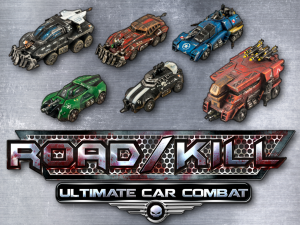 And I am also backing the third iteration of Road/ Kill Ultimate Car Combat. These guys have been plugging away trying to get this into production for a couple of years, honing their offer and now they’ve taken a different tack entirely with scale and approach. As a Dark Future fan they basically had me from the first project when I saw I could use a ‘Goliath’ truck in my games!
And I am also backing the third iteration of Road/ Kill Ultimate Car Combat. These guys have been plugging away trying to get this into production for a couple of years, honing their offer and now they’ve taken a different tack entirely with scale and approach. As a Dark Future fan they basically had me from the first project when I saw I could use a ‘Goliath’ truck in my games!
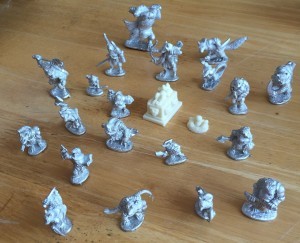
Some furry mercs from Burrows and Badgers, they have a new project expanding the range
And… What Else?
My miniatures-related Kickstarters are in various stages of production, delivery and painting. I’m still working through the big box of World of Twilight minis I received last year. There will be a specific blog post on those soon. I’ve also received my Otherworld Miniatures from their Burrows and Badgers range. Looking forward to cleaning these up and getting them painted for some different Open Combat games.
Final Thoughts
I’m not here to say what people should and shouldn’t spend their money on. Kickstarter is great for gamers, and many games companies. I saw a stat recently that more than 50% of tabletop games projects get funded, compared to a Kickstarter average of less than 30% (or thereabouts). I look at some of the other categories – Art, Comics in particular – and it’s like a tumbleweed-strewn wasteland compared to the heady heights of games projects.
That said, I think if you just see Kickstarter as an advance ordering store you are missing out on part of the appeal of crowdfunding. You have a chance to give a creator your backing, to give them not only the funds to make their dream a reality but also the knowledge that they have an audience, that they have found others receptive to their ideas.
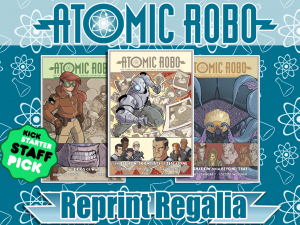 It’s a difficult balance to strike. I don’t normally back a miniatures project based purely on the ubiquitous computer-generated 3D renders we see these days. There’s a huge production line between something on a screen and a physical miniature, at any stage of which quality can be degraded. So, I kinda like to know that the creators have some skill on the production side. Measured against this, it takes time and funds to get certain art and design resources together before a Kickstarter, so what we expect from a project creator can be somewhat demanding, even unrealistic. For example, Arcane Arena from Fearless Games. This is clearly the sort of project that crowdfunding is intended for. A real start-up affair. Unfortunately, because they are literally at the start of their creation they have next to nothing to show people about what they will get. It’s a Catch-22 – most games backers want to have a good idea of what they’ll be getting, but to show them that requires an initial investment of time and money, which is the point of having a Kickstarter in the first place. Need money to make money. Capitalism, huh?
It’s a difficult balance to strike. I don’t normally back a miniatures project based purely on the ubiquitous computer-generated 3D renders we see these days. There’s a huge production line between something on a screen and a physical miniature, at any stage of which quality can be degraded. So, I kinda like to know that the creators have some skill on the production side. Measured against this, it takes time and funds to get certain art and design resources together before a Kickstarter, so what we expect from a project creator can be somewhat demanding, even unrealistic. For example, Arcane Arena from Fearless Games. This is clearly the sort of project that crowdfunding is intended for. A real start-up affair. Unfortunately, because they are literally at the start of their creation they have next to nothing to show people about what they will get. It’s a Catch-22 – most games backers want to have a good idea of what they’ll be getting, but to show them that requires an initial investment of time and money, which is the point of having a Kickstarter in the first place. Need money to make money. Capitalism, huh?
So we come back to why I love Kickstarter. It’s not a flaky Amazon with terrible delivery dates, it’s a place where every day I have an opportunity to take a punt on something to help make a creator’s dreams draw a little closer. It’s not a marketplace, it’s an exhibition. If you approach it from that perspective, if you take a risk now and then, the rewards are not just the ones listed on the Pledge Levels.
**To make sure you don’t miss out on any blog posts, you can keep up-to-date with everything Gav by signing up to my monthly newsletter. As a bonus, every other month I randomly pick a newsletter subscriber to receive a free signed copy of one of my books.**
September 26, 2015
Game Over
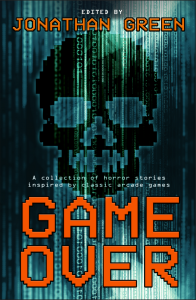 As soon as Jonathan Green asked me to contribute a story to his Game Over anthology (stories inspired by the arcade games of our youth) memories of my favourite games came flooding back and enough story ideas were popping into my brain I could have filled the whole book myself. Gauntlet, Operation Wolf, and Space Harrier, along with countless others, all took up hours of my teenage years.
As soon as Jonathan Green asked me to contribute a story to his Game Over anthology (stories inspired by the arcade games of our youth) memories of my favourite games came flooding back and enough story ideas were popping into my brain I could have filled the whole book myself. Gauntlet, Operation Wolf, and Space Harrier, along with countless others, all took up hours of my teenage years.
My contribution to the anthology, It Was Beauty… is based on… actually, we’ll see if you can work it out for yourself – an extract is available here. The book also contains tales from the likes of James Swallow, James Wallis, Jonathan Green (with whom we had a mini flash-mob at Nine Worlds Geekfest) and many others.
The first reviews are now up, including one in the Financial Times – that’s a first for me!
“The stories delve beneath the clunky graphics to find paranoia, madness, murder and ghosts.”
– James Lovegrove, Financial Times
“Creepily odd – if you like horror stories with an angle, or you enjoy arcade games, or remember those smelly places – then this is definitely for you.”
– Gameing Weirdness, Amazon
“All the stories are excellent and involving. It Was Beauty by Gav Thorpe pulls your heart strings when you least expect it.” 5 stars
– Daryl Smith, Amazon
The book is available as both paperback and eBook – full details can be found here.
Which video game from your youth would inspire you to write a story?
If you’ve read Game Over, I’d love to know what you thought of it. Please let me have details of any reviews you’ve written, or leave a message in the comments. Thanks.
**To make sure you don’t miss out on any blog posts, you can keep up-to-date with everything Gav by signing up to my monthly newsletter. As a bonus, every other month I randomly pick a newsletter subscriber to receive a free signed copy of one of my books.**




